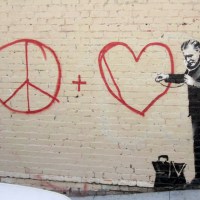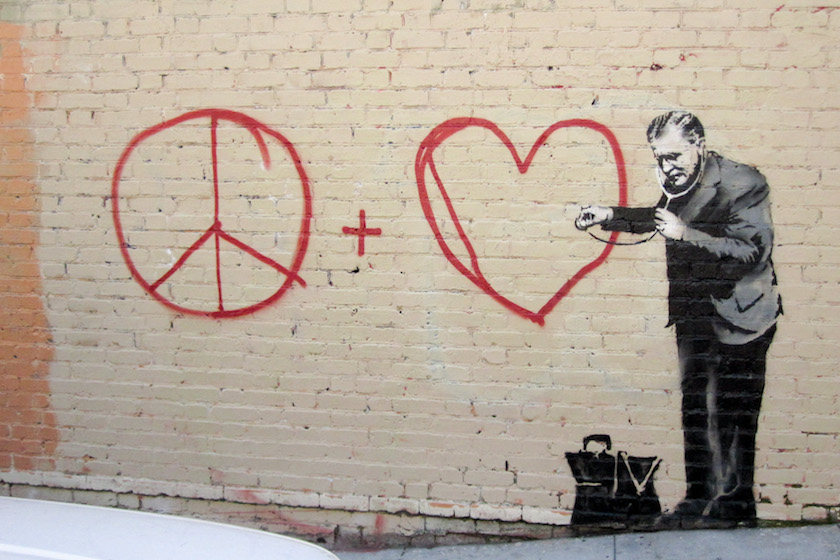We stood outside the glass doors of the hospital, my childhood friend and I, poised to go our separate ways. His father was upstairs, on the 2nd floor, and the outlook was grim.
“The fact that he’s up there is one thing,” he said, looking up over his shoulder. “But coming on the heels of this thing with my mom… it’s like everyone thinks there is one cup of love,” he held his hand together like a cup, “and if I pour this much into his cup, that only leaves me this much to pour into her cup. But love isn’t like that. Love isn’t finite.”
This thing with his mom. A week previous there had been a huge blow-up. When you’ve got a volatile, dysfunctional family, the smallest, most insignificant thing can set off a firestorm of texts that start with name calling and end with your mother disowning you. Then, next thing you know, you’re standing on a curb in front of the hospital where your father might be dying, staring at your cup-shaped hands, tempted to give up.
This is our world right now—and not just my friend’s world. Last year’s election was one of the most divisive in history. It left friends and family members eyeing each other across a proverbial line in the sand—feeling more like enemies than friends.
But we cannot stop the hate outside our walls when there is hate inside our hearts and inside our homes.
Like when you’re at lunch with a dear friend and she says we need to dial back aid to refugees because “they are all the same over there with their constant fighting” and all Muslims want to kill us. The sound you hear in your head is like a needle scratching across a vinyl record. You sit and wonder how this is possible and how you’ll go forward from here because everything you thought you knew about this person must be wrong.
The how is this: You love anyway.
Not because you’re neutral about refugees. But because you know that you can’t hate people into loving each other. So you dig deep into your friend’s humanity. You get blood to blood and skin to skin with her human-ness because that is the core of who we are.
You seek to understand because you know that we belong to each other and our well-being is wrapped up in one another’s. You choose to see beyond labels because you know we are more than Bernie supporters or Trump supporters or Hillary supporters—we are people who need to be loved and respected.

With time and intention, we can love anyway, despite the differences that sometimes feel like walls between us.
We can love anyway when our mother wants to disown us for loving our father too much.
We can love anyway and correct gently when we work for an organization that fights racism and our son gets irritated at the Hispanic lady in McDonald’s because her accent is too heavy.
We can love anyway by feeding Muslim refugees even though we’re terrified of ISIS.
We love anyway because preemptive love has the power to unmake violence and remake our world.
It’s like my friend said… love is not finite. Humans are amazing in their capacity to love—it’s a spring inside us that fills up constantly, no matter how much you take out of it. There’s no limit to love. Or at least, there doesn’t have to be.
I sat practicing this in a hard moment today. My friend’s mother was texting, asking me to pass along vile messages to him about how she made the right decision to disown him. I cradled the phone in my hands and stared at her messages trying to decide how to respond. I really wanted to text back a list of all the ways I thought she was a horrible and disappointing mother. But being angry and self-righteous would only distance me from her and turn me into a bitter and angry person, instead of the loving person I really want to be.
Loving others is a daily work in progress. Just because you make a conscious decision to love anyway, doesn’t mean you suddenly become a perfect human being constantly filled with warm, fuzzy feelings. The truth is sometimes you just want to punch people in their angry mouths. But the thing is… you don’t.
Instead, you breathe deep and muster up the most loving thought you can at the moment and let that arrow loose—straight to their heart. Then you hold your breath and wait for the world to change.
So, “I’m sorry you’re hurting,” is what I typed instead of the angry thoughts swirling through my head. “I wish there was something I could do to make things better between the two of you. I know, deep down, you both really love each other.”
I pushed send. And now I wait.



